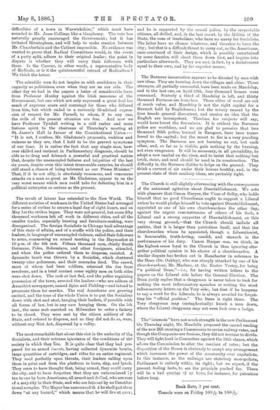The Church is still slightly effervescing with the consequences of
the autumnal agitation about Disestablishment. We note with pleasure that Canon Harper, the Vicar of Selby, who holds himself that no good Churchman ought to support a Liberal unless he would pledge himself to vote against Disestablishment, appointed as one of his own churchwardens the other day, against the urgent remonstrances of others of his flock, a Liberal and a strong supporter of Disestablishment, on this very strong ground,—that the Church shoulkl include all parties, that it is larger than patriotism itself,. and that the churchwarden whom he appointed, though a Liberationist, is honourable, truth-loving, candid, and staunch in the performance of his duty. Canon Harper was, we think, in the highest sense loyal to the Church in thus ignoring alto- gether political opinion in his -choice of a churchwarden. A similar dispute has broken out in Manchester in reference to the Dean (Dr. Oakley), who was sharply attacked by one of his churchwardens, Mr. Maclure, at the Easter Vestry, for being "a political Dean,"—i.e., for having written letters to the papers on the Liberal side before the General Election. The Dean justly replies that a clergyman is never taken to task for making the most inflammatory speeches or writing the most inflammatory letters on the Tory side; but that if he happens to say a word for the Liberals, he is always assailed for forget- ting his "official position." The Dean is right there. The Tory clergyman may (metaphorically) knock a man down, where the Liberal clergyman may not even look over a hedge.














































 Previous page
Previous page